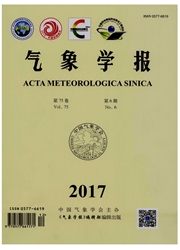

 中文摘要:
中文摘要:
南亚高压是对流层中上层重要的大气活动中心.文中选取200hPa等压面,应用1948—2006年NCEP/NCAR月平均再分析资料、NCAR的CAM3.0大气环流模式,分析了南亚高压强度的季节持续性异常特征及其与ENSO事件的关系,结果表明南亚高压强度的冬—春—夏的季节持续性异常特征,这种长达半年以上的季节持续性异常与ENSO事件存在密切关系。进一步分析发现,南亚高压强度异常程度的时间演变特征与赤道东太平洋海温表征的ENSO信号的演变特征并不一致,南亚高压强度度异常滞后ENSO信号,对ENSO信号的响应从前一年的12月开始,一直持续到当年的9月,1—5月强度异常最强,6—9月强度异常次之。1月Nino3.4指数时滞自相关表征的ENSO事件春季开始,夏秋季发展,冬季成熟,来年春季开始减弱,夏季基水消失。不同海区数值试验结果表明:在ENSO事件成熟期的冬季,南亚高压与赤道东太平洋海温关系密切,在ENSO事件衰减期的春季,与赤道东太平洋和印度洋海温关系密切,在ENSO事件衰减期的夏季,与印度洋海温关系密切。
 英文摘要:
英文摘要:
The south Asia high(SAH) is one of the main action centers in the upper-middle troposphere.Based on the 200 hPa data,the NCEP/NCAR monthly reanalysis data for 1949 - 2006 and using the NCAR community atmosphere model (CAM3.0),the persistent strength anomaly of the SAH and its relationship to ENSO events are studied.The results show that there exists a winter-spring-summer persistent anomaly of the SAH intensity in some years whose association with ENSO events are very close.Furthermore,the evolution features of the SAH abnormal degree is not well consistent with that of ENSO evolution characterized by the equatorial eastern pacific SST with the SAH lagginger than the ENSO.The response of the SAH strength to the ENSO starts from December in the previous year,with the maximum anomalies occuring during January-May, and the secondary maximum during June-September.ENSO event characterized by the self-correlation of Nino3.4 in January begin in spring,develop in summer and autumn,reach mature in winter and gradually weaken in spring of the next year and disapper basically in summer.The simulative results for the different ocean basins using CAM3.0 show that in winter that is the mature period of the ENSO,the equatorial eastern Pacific SSTs play an important role in the SAH anomaly;in spring that is the decaying phase of ENSO events,both the equatorial eastern Pacific and the Indian Ocean have much effect on the anomaly SAH;and in summer during ENSO events decay in the tropical eastern Pacific,the Indian Ocean plays an important role in the SAH anomaly.
 同期刊论文项目
同期刊论文项目
 同项目期刊论文
同项目期刊论文
 期刊信息
期刊信息
